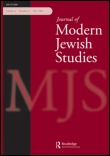
Journal of Modern Jewish Studies
Scope & Guideline
Connecting Past and Present: The Pulse of Jewish Scholarship
Introduction
Aims and Scopes
- Interdisciplinary Exploration of Jewish Identity:
The journal emphasizes the complex and multifaceted nature of Jewish identity, examining how it is shaped by cultural, historical, and social factors across different communities. - Historical Perspectives on Jewish Life:
A significant focus is placed on the historical experiences of Jewish communities, including studies of migration, persecution, and resilience, particularly in relation to major events such as the Holocaust and the establishment of Israel. - Cultural Production and Representation:
The journal explores Jewish contributions to literature, art, and music, analyzing how these forms of expression reflect and shape Jewish identity and experience. - Contemporary Issues and Debates:
The journal addresses current debates within Jewish communities, including discussions on Zionism, antisemitism, and the role of women, providing a platform for diverse voices and perspectives. - Engagement with Religious Thought and Practice:
Research includes examinations of Jewish religious practices, beliefs, and philosophies, highlighting how these elements inform community life and individual identity.
Trending and Emerging
- Intersectionality in Jewish Studies:
There is a growing trend to analyze Jewish identity through the lens of intersectionality, examining how factors such as race, gender, and class interact to shape Jewish experiences in diverse contexts. - Global Perspectives on Jewish Life:
Recent publications increasingly reflect a global perspective, focusing on Jewish communities outside of Europe and North America, including those in Latin America, Asia, and Africa. - Digital Humanities and Jewish Studies:
The incorporation of digital humanities tools and methodologies is emerging as a significant trend, enabling new forms of analysis and engagement with Jewish texts and history. - Memory Studies and Holocaust Representation:
Research on memory, particularly related to the Holocaust and its representation in contemporary culture, is gaining prominence, reflecting broader societal debates about memory and trauma. - Cultural and Political Activism:
The journal is seeing more studies focused on Jewish activism, particularly in relation to social justice and political movements, illustrating the active role of Jewish communities in contemporary societal issues.
Declining or Waning
- Traditional Historical Narratives:
There has been a noticeable shift away from conventional narratives that focus solely on persecution and victimhood, as contemporary scholarship increasingly seeks to present a more nuanced understanding of Jewish agency and resilience. - Homogeneous Representations of Jewish Culture:
The journal is moving away from studies that portray Jewish culture as monolithic. Instead, there is a growing emphasis on the diversity within Jewish experiences, particularly regarding ethnicity, gender, and regional differences. - Focus on Early Modern Jewish History:
Research on early modern Jewish history, particularly in Europe, has seen a decline, as scholars increasingly turn towards contemporary issues and the modern period, reflecting a shift in the field's priorities. - Studies of Jewish Assimilation:
The exploration of Jewish assimilation narratives is becoming less common, with more attention being paid to multicultural interactions and the complexities of identity in diasporic contexts.
Similar Journals

JEWISH SOCIAL STUDIES
Illuminating the past, present, and future of Jewish social thought.Jewish Social Studies is a prominent peer-reviewed journal published by Indiana University Press, dedicated to advancing the field of Jewish scholarship through interdisciplinary exploration and critical inquiry. With an ISSN of 0021-6704 and an E-ISSN of 1527-2028, this journal has become a vital resource for researchers and scholars, achieving Q2 rankings in both History and Religious Studies, as well as strong standings in Anthropology and Cultural Studies. The journal bridges the gaps between diverse academic disciplines, focusing on the multifaceted dimensions of Jewish life, culture, and history, making it essential reading for anyone engaged in the study of Judaism. Although it does not currently offer Open Access options, the journal promotes a wealth of rigorous research, critical perspectives, and in-depth analyses that contribute significantly to the understanding of Jewish Studies from 1975 to the present day, with ongoing issues scheduled until 2024. With an established audience of scholars, professionals, and students, Jewish Social Studies remains a leading platform for intellectual discourse and scholarly exchange in the humanities.

Nordisk Judaistik-Scandinavian Jewish Studies
Unraveling the Complexities of Jewish Identity in ScandinaviaNordisk Judaistik-Scandinavian Jewish Studies is a distinguished academic journal dedicated to the exploration of Jewish culture, history, and religious practices in the Scandinavian context. Published by the DONNER INSTITUTE FOR RESEARCH ON RELIGIOUS AND CULTURAL HISTORY in Finland, this journal has been an open access platform since 2016, allowing easy dissemination of knowledge and fostering scholarly communication among researchers, educators, and students. With a variety of subjects encompassing Anthropology, Cultural Studies, History, and Religious Studies, the journal has achieved commendable recognition, with its latest rankings placing it in Q2 in several categories according to the 2023 Scopus rankings. The journal's significant contribution to the field is evident through its impact, evidenced by its strategic position within its respective quartiles. By bridging interdisciplinary methodologies and Jewish studies within a Scandinavian framework, Nordisk Judaistik serves as an essential resource for those engaged in the complexities and nuances of Jewish heritage and identity in the region.

Tradition-A Journal of Orthodox Jewish Thought
Nurturing the Legacy of Jewish IntellectualismTradition: A Journal of Orthodox Jewish Thought is a prestigious academic journal published by the Rabbinical Council of America, dedicated to the exploration and analysis of Orthodox Jewish thought and its implications on contemporary issues. With a legacy dating back to 1973, this journal serves as a crucial platform for scholars, theologians, and students interested in the rich tapestry of Jewish philosophy, law, and ethics. Although it does not offer open access, its thoughtful, peer-reviewed articles are essential for advancing knowledge in Jewish academia and fostering dialogue within the broader cultural context. As an authoritative voice in the field, Tradition invites submissions that challenge, inform, and inspire further inquiry into the complexities of Jewish tradition, ensuring that it remains at the forefront of scholarly discussion.
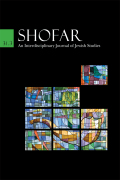
Shofar-An Interdisciplinary Journal of Jewish Studies
Unveiling the Rich Tapestry of Jewish ScholarshipShofar: An Interdisciplinary Journal of Jewish Studies, published by Purdue University Press, is a prominent peer-reviewed journal that engages with the diverse and rich tapestry of Jewish studies through interdisciplinary approaches. With a focus on cultural studies, history, and religious studies, the journal has established itself within the academic community, achieving significant recognition evidenced by its Q3 ranking in these disciplines as of 2023. Researchers and scholars in the field will find valuable insights and innovative discussions that push the boundaries of traditional scholarship. Though currently not open access, Shofar offers an enriching forum for scholarly discourse that fosters a deeper understanding of Jewish identity, history, and culture, making it an essential resource for professionals and students alike. The journal's ISSN is 0882-8539, while its E-ISSN is 1534-5165. It is operational from 2014 to 2024 and is located in the United States.
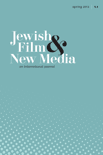
Jewish Film & New Media-An International Journal
Chronicling the Evolution of Jewish Narratives in Film and New MediaJewish Film & New Media: An International Journal, published by Wayne State University Press, serves as a crucial platform for scholars and practitioners within the realms of Film Studies, Jewish Studies, and Media Studies. Since its inception, the journal has explored the intersection between Jewish culture and cinematic representation while also addressing contemporary media narratives. With an ISSN of 2169-0324 and E-ISSN 2169-0332, it is indexed in major databases, showcasing solid rankings in various disciplines, including a commendable Q2 rank in Visual Arts and Performing Arts. Despite its current Q4 categorizations in Anthropology and Communication, the journal is noted for its engaging contributions that sow rich discussions about Jewish identity, filmic expression, and media representation. Researchers and students alike benefit from the journal’s wealth of interdisciplinary scholarship, which spans converged years from 2013 to 2017 and 2019 to 2022, ensuring a robust timeline of critical inquiry. As an essential resource for understanding the nuances of Jewish film and new media, this journal occupies a unique niche, inviting contributions that push the boundaries of current academic dialogue.
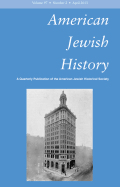
AMERICAN JEWISH HISTORY
Exploring the Tapestry of Jewish Life in AmericaAMERICAN JEWISH HISTORY is a premier academic journal published by Johns Hopkins University Press, dedicated to the exploration and analysis of the Jewish experience in the American context. With ISSN 0164-0178 and E-ISSN 1086-3141, this journal serves as a vital resource for scholars and students in the fields of cultural studies, history, and religious studies, as evidenced by its placement in the Q3 quartile across these disciplines in 2023. Reaching a broad audience interested in the historical, social, and cultural dimensions of the American Jewish narrative, the journal has converged in various years, ensuring a robust collection of multidisciplinary research and discussions. Although it operates under a traditional subscription model, the journal remains an essential platform for critical analysis, fostering deeper understanding of Jewish identity and history. With Scopus rankings placing it at the 60th percentile in History and 62nd percentile in Religious Studies, AMERICAN JEWISH HISTORY stands as a respected publication that significantly contributes to the discourse surrounding Jewish history and culture in the United States.

Judaica Bohemiae
Documenting the Evolving Dynamics of Jewish LifeJudaica Bohemiae, published by the Zidovske Muzeum Praze, is a prominent scholarly journal dedicated to the study of Jewish culture, history, and religious practices, with a particular focus on the Czech Republic and Central Europe. Since its relaunch in 2007, the journal has established itself as a valuable resource in the fields of Cultural Studies, History, and Religious Studies, achieving a commendable Q2 ranking across these disciplines in 2023. With its thoughtful compilation of research articles and critical essays, Judaica Bohemiae offers insights into the evolving dynamics of Jewish existence and identity. Although it does not currently operate under an open access model, the journal ensures that its high-quality content remains accessible to researchers, professionals, and students interested in the nuanced intersections of culture and history. By promoting rigorous academic discourse and advancing the understanding of Jewish heritage, Judaica Bohemiae continues to play a crucial role in its field, fostering scholarly connections and illuminating the past for future generations.
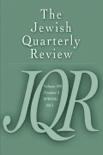
JEWISH QUARTERLY REVIEW
Exploring the Depths of Jewish Culture and HistoryJewish Quarterly Review, published by University of Pennsylvania Press, is a distinguished academic journal that delves into the multifaceted realms of Jewish culture, history, and religious studies. With a rich publication history dating back to 1953 and an impressive track record of rigorous scholarship, this journal maintains a Q2 ranking in key categories such as Cultural Studies, History, and Religious Studies in 2023, placing it among the top-tier journals in its field. The ISSN number 0021-6682 and the E-ISSN 1553-0604 ensure that its scholarship is widely accessible and traceable in academic databases. While the journal is not open access, it remains an essential resource for researchers, professionals, and students seeking in-depth analysis and perspectives on Jewish thought and heritage. The JQR is known for its editorial commitment to enhancing understanding and dialogue across cultural and historical contexts, making it an invaluable asset for anyone engaged in Jewish studies and related disciplines. With its headquarters in Philadelphia, PA, the journal continues to foster scholarly engagement and critical discourse on Jewish identity and experience through its carefully curated articles and reviews.
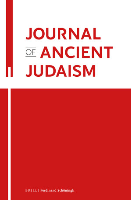
Journal of Ancient Judaism
Illuminating the Cultural Contexts of Ancient JudaismThe Journal of Ancient Judaism is an esteemed academic publication focusing on the dynamic field of religious studies, particularly the historical and cultural contexts of ancient Judaism. Published by BRILL, a reputable international publisher known for its scholarly contributions, this journal is dedicated to advancing the study of ancient Jewish texts, traditions, and their socio-political environments. With an ISSN of 1869-3296 and an E-ISSN of 2196-7954, the journal has established its footprint in the scholarly community, supported by its ranking in the Q3 quartile for Religious Studies in 2023 and a Scopus rank of #371 out of 644 in its category. The content showcased in this journal is vital for researchers, professionals, and students alike, offering peer-reviewed articles that contribute to the broader understanding and appreciation of ancient Jewish heritage and its influence on contemporary religious thought. With a timeline spanning from 2015 to 2024, the journal aims to facilitate rigorous academic discourse and provide open access to vital research findings, fostering a deeper engagement with the complexities of ancient Judaism.

Images
Fostering Dialogue Through Visual RepresentationsImages, published by BRILL, serves as a significant academic platform within the realms of Cultural Studies, History, Religious Studies, and the Visual Arts and Performing Arts. With its ISSN 1871-7993 and E-ISSN 1871-8000, this journal is committed to providing a scholarly forum that engages with the complexities of visual representations and their impact on cultural narratives. Though it currently holds a Q4 category ranking across various fields, indicating room for growth, its presence in Scopus rankings showcases its contribution to the arts and humanities, positioning it as a unique voice in interdisciplinary discourse. The journal aims to publish innovative research that fosters dialogue among scholars, practitioners, and students interested in the intersections of visual culture and societal dynamics. Despite its non-open access status, Images remains a vital resource for those seeking to understand the intricate fabric of cultural expressions from historical and contemporary perspectives, offering insights that resonate across academic and artistic landscapes.